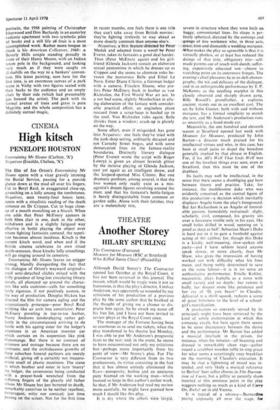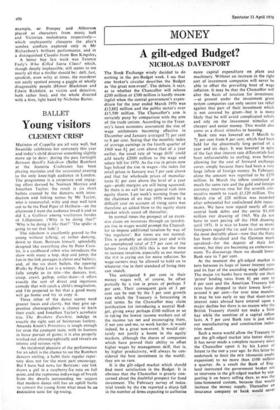THEATRE
Another Storey
HILARY SPURLING
The Contractor (Fortune) Measure for Measure (RSC at Stratford) Who Killed Santa Claus? (Piccadilly) Although David Storey's The Contractor opened last October at the Royal Court, it has not been reviewed in this journal. The reason, which would be tragic were it not so humorous, is that the play's director, Lindsay Anderson, was apparently so wounded by my criticisms of his production of a previous play by the same author that he baulked at the thought of giving me a chance to dis- praise him again. So he struck my name off his free list, and I have not been invited to review plays at the Royal Court since.
The manager of the Fortune having been so courteous as to send me tickets, when the play transferred to his theatre last Monday, I was able to put Mr Anderson's prognostic fears to the test; and, in the event, he seems to have misconstrued not only my criticisms but—perhaps more importantly from his point of view—Mr Storey's play. For The Contractor is very different from its two predecessors, its virtue consisting in the fact that it has almost entirely eliminated the flaws—pomposity, bathos and an unctuous piety beamed on the working man—which loomed so large in this author's earlier work. So that, if Mr Anderson had read my review more carefully, he might have guessed how much I should like this play._
It is dry where the others were turgid, severe in structure where they were built on baggy, conventional lines. Its shape is per-
fectly spherical, dictated by the comings,and
-goMgs of -five workmen who, in three acts, --erectrm and dismantle a wedding marquee. -What-makes the play so agreeable is that it is virtually plotless, or at least has reduced the
doings of that trite, obligatory trio—self- made parents out of touch with dumb, suffer- ing, expensively educated son—almost to vanishing pointpn its outermost fringes. The evening's chief pleasures lie in its deft choreo- graphy, the wit and delicacy of the dialogue, and in an unforgettable performance by T. P. McKenna as the needling marplot in this closely observed and sharply drawn gang.
Billy Russell's grandfather, a captious ancient, stands out in an excellent cast. The set by John Gunter, both with and without marquee, has a formal simplicity to match the text, and Mr Anderson's production runs as smoothly as a hand-made car.
Meanwhile, the one hundred and eleventh season at Stratford opened last week with Measure for Measure, produced by John Barton—a director much praised for his intellectual virtues and who, in this case, has been at small pains to dispel the boredom generally implied by that phrase in English. For, if his All's Well That Ends Well was one of the loveliest things ever seen, even at Stratford, then this must be one of the drabbest.
Its faults may well be intellectual, in the sense that there seems a disobliging gap here between theory and practiCe. Take, for instance, the meddlesome duke who was evidently conceived as the central figure of this production—a decision which inevitably displaces Angelo from the play's foreground. But Ian Richardson is an Angelo of formid- able passion, formidably restrained: slight, scholarly, civil, composed, his gravity sits over a fierceness visible only in his eyes, like small holes drilled in wood, opening on 'a pond as deep as hell'. Sebastian Shaw's Duke is hard put to it to gain a foothold against acting of thi-t calibre; for, though this Duke is a kindly, well-meaning, slow-spoken old party—and I have seldom heard anyone speak slower, or more clearly, than Mr Shaw, who gives the impression of having worked out with difficulty what his lines mean, and being nobly determined to save us the same labour—it is in no sense an authoritative performance. Estelle Kohler, meanwhile, plays Isabella as a minx with small variety and no depth: her venom is huffy, her despair more like petulance and her cry of '0, you beast!' to Claudio, delivered in a shrill squeak, reduces a scene of great bitterness to the level of a school- girl's mortification.
A production so unevenly served by its principals might have been retrieved by the kind of subtle orchestration at which this company excels, but here again there seems to be some discrepancy between the desire and the performance. Mr Barton has added a musical interlude in the prison, for instance, when the inmates—all beaming and dressed in remarkably clean rags—gather round a scrubbed wooden table to sing grace for what seems a surprisingly cozy breakfast on the morning of Claudio's execution. It may be that a lightening of mood was in- tended, and very likely a musical reference to Berlioz' beer cellar chorus in The Damna- tion of Faust, but a jollity so patently sham inserted at this ominous point in the play suggests nothing so much as a kind of Carry On, Duke! set in old Vienna.
It is typical of a whimsy—Barnardine peeing copiously all over the stage, for example, or Pompey and Abhorson played as characters from music hall and Victorian melodrama respectively— which unpleasantly cheapens the play's sombre conflicts explored only in Mr Richardson's brilliant performance, and in a distinguished Claudio from Ben Kingsley' A better buy last week was Terence Feely's Who Killed Santa Claus? which, though deeply implausible, still seems to me nearly all that a thriller should be: deft, fast, spookish, even witty at times, the murderer not easily spotted among a gaggle of wholly disagreeable people (Honor Blackman and Edwin Richfield, as victim and detective, both rather fine), and the whole directed with a firm, light hand by Nicholas Barter.







































 Previous page
Previous page